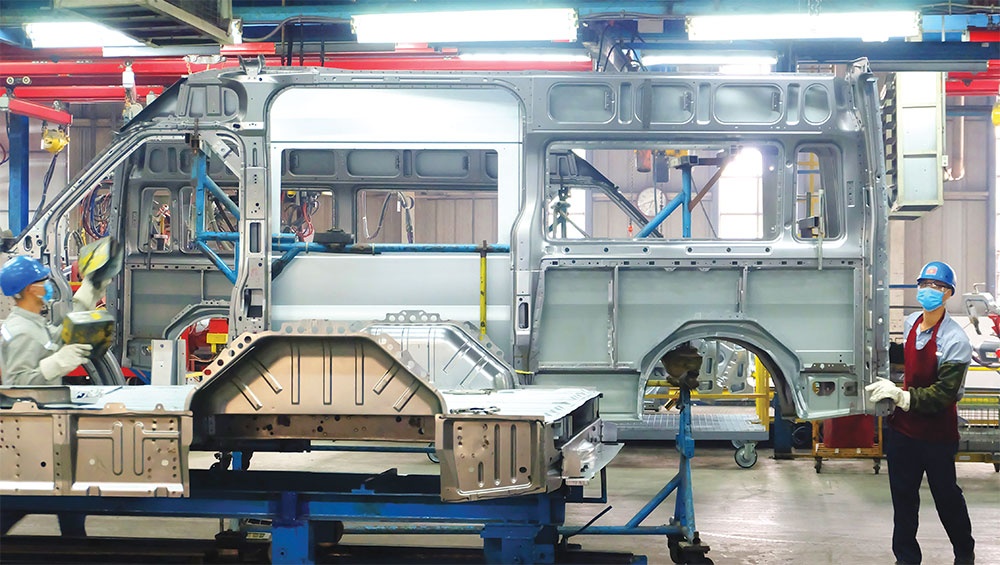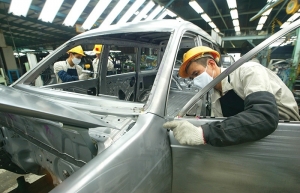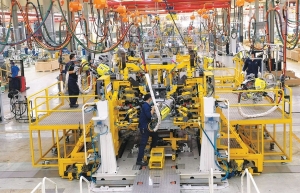Business mods tackle vehicle demand slump
 |
| Purchasing power is not yet consistently strong enough for car sales to reach a suitable level, Le Toan |
Vo Quoc Binh, managing director of Ho Chi Minh City trader Binh Minh Company, said this year’s interest rates on auto loans were 3-4 per cent higher than a year ago. Therefore, middle-income consumers must consider that when purchasing a vehicle for around $21,000, they will be required to pay an additional $2,000 annually.
Do Tien Dung, chairman of Hang Xanh Motor Services (Haxaco), in April said that the motivation to purchase automobiles was no longer favourable compared to a year ago when interest rates were above 10 per cent. This resulted in the market slipping into a large oversupply and increasing inventories, thereby dragging down the profits of distributors.
“The first quarter sales were a record low because only a handful of automobiles were sold per month,” Dung said. “Haxaco anticipates a pre-tax profit of $13.2 million in 2023, the same as in 2022. We recorded a profit of just over $212,000 in Q1, the majority of which came from the service segment. Haxaco’s profit for the first quarter of 2022 was $2.98 million. We are striving to lower the value of our inventory to $25.5 million.”
According to a report published on April 28 by Saigon General Service Corporation (Savico), a more severe business climate compelled the company to modify its business plan for 2023, resulting in a 25 per cent decrease in profit after tax to $18.7 million compared to 2022. In the first quarter of 2023, Savico’s profit decreased by almost 85 per cent, reaching only $626,000 and falling by more than 11-fold from the previous quarter.
In 2022, Savico, the largest automotive distributor in Vietnam, earned a net profit of $14 million, an increase of 126 per cent over the previous year. This record was the result of demand recuperating from the pandemic and the positive impact of the 50 per cent registration fee policy, while the shortage of supply has caused the prices of many models to rise.
The market may require 3-6 months to rebalance. Savico has established a conservative business plan for 2023, with profits down 20 per cent from the previous year due to sales of prestige automobiles, new energy vehicles, and intensive management activities.
The ASEAN Automotive Federation said last month that the Vietnamese auto market experienced the second-greatest decline in Southeast Asia in the first quarter of 2023, with sales down over 22 per cent on-year. Vietnam had the second-largest deceleration after Myanmar.
In the first quarter, the Vietnamese market produced just over 38,400 automobiles, a decrease of 29.5 per cent compared to the same period last year. Dao Cong Quyet, a representative of the Vietnam Automobile Manufacturers Association, said that the tough domestic economy and high bank interest rates had rapidly reduced auto consumption since the end of last year.
According to the General Statistics Office, GDP for the first quarter of 2023 was estimated at 3.32 per cent, only slightly higher than the GDP for the first quarter of 2020, with the processing and manufacturing industries declining by 0.37 per cent.
“Automotive purchasing power has shown signs of decline over the past two months, despite the end-of-year increase in purchasing power,” Quyet said. “In 2022, member carmakers sold a total of 404,635 vehicles, an increase of one-third compared to 2021.”
Analysts said that after the government modifies a number of policies, interest rates, and taxation, the car market is likely to experience sales growth towards the end of this year. Obstacles to registration activities are being removed, and the second quarter will see a gradual relaxation of monetary policy.
Currently, interest rates on the market have begun to decrease after the State Bank of Vietnam lowered operating interest rates on April 3 by up to 0.5 per cent per year, creating advantages for consumers considering a purchase.
Meanwhile, many businesses anticipate a return of growth momentum if the government makes tax cuts for the remaining quarters of this year. In March, the government tasked the Ministry of Finance and the Ministry of Industry and Trade with examining registration fee incentives and extending the payment of excise tax on domestically assembled vehicles to alleviate difficulties for businesses.
In Vietnam, it is customary to provide enterprises with temporary tax incentives for vehicles. In 2022, a 50 per cent cut in registration fees until June 2022 contributed to the Vietnamese market’s consumption of automobiles surpassing 500,000 units for the first time.
 | Customer satisfaction wavers with inflated vehicle prices Inadequate inventories as a result of the ongoing global semiconductor shortage are leading to car dealers in Vietnam attempting to force thousands of US dollars worth of extras onto potential customers, much to their chagrin. |
 | Auto dealers bemoan slower festive period Economic uncertainties and tightening credit for loans have left the domestic car market in the lurch, regardless of a plunge in prices. |
What the stars mean:
★ Poor ★ ★ Promising ★★★ Good ★★★★ Very good ★★★★★ Exceptional
Related Contents
Latest News
More News
- State corporations poised to drive 2026 growth (February 03, 2026 | 13:58)
- Why high-tech talent will define Vietnam’s growth (February 02, 2026 | 10:47)
- FMCG resilience amid varying storms (February 02, 2026 | 10:00)
- Customs reforms strengthen business confidence, support trade growth (February 01, 2026 | 08:20)
- Vietnam and US to launch sixth trade negotiation round (January 30, 2026 | 15:19)
- Digital publishing emerges as key growth driver in Vietnam (January 30, 2026 | 10:59)
- EVN signs key contract for Tri An hydropower expansion (January 30, 2026 | 10:57)
- Vietnam to lead trade growth in ASEAN (January 29, 2026 | 15:08)
- Carlsberg Vietnam delivers Lunar New Year support in central region (January 28, 2026 | 17:19)
- TikTok penalised $35,000 in Vietnam for consumer protection violations (January 28, 2026 | 17:15)

 Tag:
Tag:




















 Mobile Version
Mobile Version